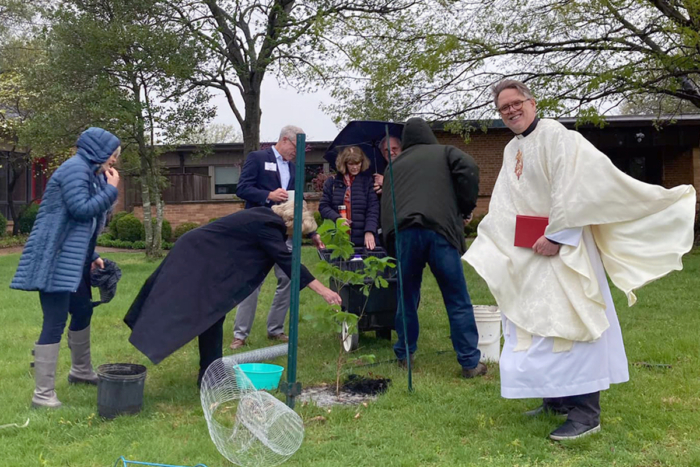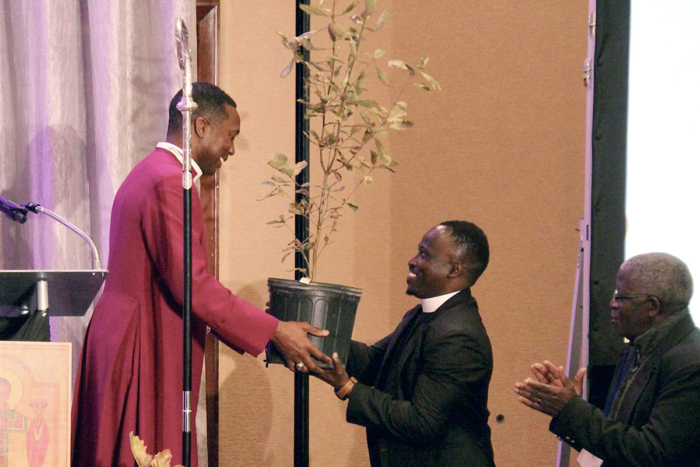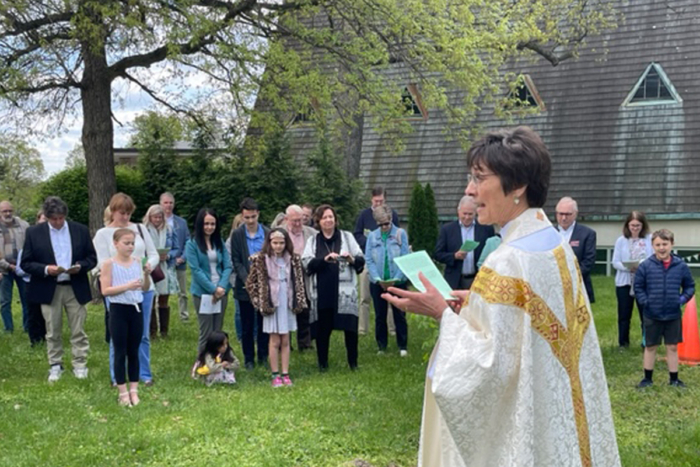Missouri congregations mark Earth Day by planting trees, joining Anglican Communion forest initiativePosted Apr 27, 2023 |
|

The Rev. Earl Mahan and parishioners at Hope Episcopal Church in Town and Country, Missouri, on April 16 plant their church’s tree provided by the diocese through The Communion Forest initiative to protect forests and to plant trees across the Anglican Communion. Photo: Facebook
[Episcopal News Service] Congregations across the Episcopal Diocese of Missouri planted trees for Earth Day as part of the diocese’s commitment to creation care that includes joining a global initiative to protect forests and to plant trees across the Anglican Communion. Missouri Bishop Deon Johnson was part of a group of bishops who were present when Archbishop of Canterbury Justin Welby introduced The Communion Forest initiative by planting a tree during the 2022 Lambeth Conference at Lambeth Palace, his official residence.
Trees play an important role in absorbing carbon dioxide from the atmosphere and storing it. Carbon dioxide is a greenhouse gas that warms the plant, leading to climate change. Human activities have increased carbon dioxide levels in the atmosphere by 50% in the last 200 years.
“When you think of climate change, most of the time it feels so big and so overwhelming,” Johnson told Episcopal News Service. “We realized that as with anything else, it’s the small little acts that make a huge difference when they’re put together with other small acts.”

Missouri Bishop Deon Johnson presents an oak sapling to the Rev. Mtipe Koggani of Grace African Christians Connection in St. Louis, a mission of the diocese, during the diocese’s convention last November. Photo: Janis Greenbaum
The first part of Missouri’s Communion Forest participation began last November, when at the diocesan convention Johnson gave each congregation a young oak sapling with instructions to care for it over the winter and then plant it this spring, preferably near Earth Day. He chose oak trees that are native to Missouri, he said, because they take 30 years to mature. “It’s kind of planting the future of each congregation in the trees,” he said, as he asked churches to envision their legacy during the time the tree reaches maturity. Trees, he noted, still thrive even on properties where Episcopal churches long ago closed.

The Rev. Mary Haggerty leads parishioners at Grace Episcopal Church, Kirkwood, Missouri, in planting a tree on April 23 after the morning service. Photo provided by Janis Greenbaum
Missouri’s trees were provided to the diocese at no cost by Forest ReLeaf of Missouri, whose mission is to enrich local communities by growing and planting trees. Diocesan creation care mission the Rev. Kevin McGrane told ENS the trees also have the benefit, after their initial years of growth, of sequestering carbon for the remainder of their life, which often can be as much as 100 years.
A 2019 report from the United Nations Intergovernmental Panel on Climate Change describes the importance of protecting forests as one of the strategies to fight climate change. The report finds that forests consistently diminish heat extremes, and preserving tropical forests is especially important for cooling the global climate.
Other tangible ways to make a difference
Beginning this spring, each person in the diocese who is baptized, confirmed or received, is given a package of wildflower seeds to plant. Over the course of a year, Johnson said 300 people could be planting wildflowers, “with a whole bunch of bees and pollinators and other species being fed.” McGrane said the diocese also is encouraging individual parishioners to plant pollinator gardens at their homes, to help provide food for migrating birds and butterflies that fly over the Midwest between North and South America each year.
When clergy are ordained, celebrate milestone ordination anniversaries or are installed in a new church, Johnson has a tree planted in Madagascar to help reforestation efforts through the work of the Missouri Botanical Garden. Each tree bears a plaque with the person’s name on it, and the bishop said he hopes someday to see pictures of a clergy member who has visited their tree.
In advance of the March 2024 revival featuring Presiding Bishop Michael Curry, Johnson said he wanted the diocese to be involved in an outreach project that would connect all congregations. With every church located near a river, stream or brook, he decided to ask Episcopalians to help clean up bodies of water near them, and the deacons of the diocese are organizing that project now.
Looking longer into the future, McGrane said Missouri is working to make solar panels available to congregations to help move church buildings away from fossil fuels toward using solar energy.
McGrane hopes all these efforts help remind people that they exist not to have dominion over the earth but to be its stewards. “Being a good steward of this planet is a holy act, a sacred act, and we want people to understand that part of their vocation as a disciple of Jesus is to take care of the world God created because this entire planet is a sacred place.”
–Melodie Woerman is a freelance writer and former director of communications for the Diocese of Kansas.

Social Menu